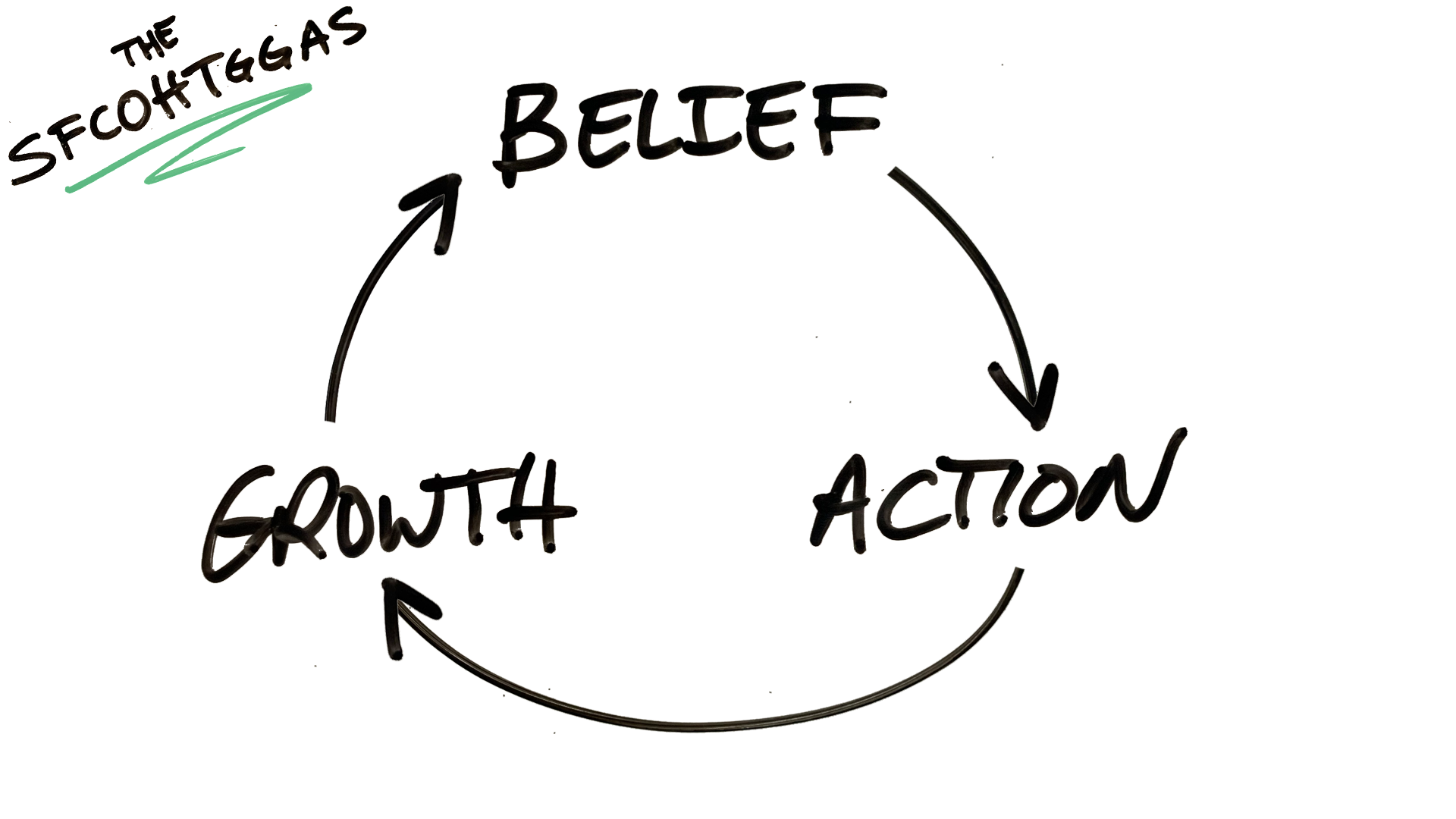TABLE OF CONTENTS
2. Why Mindsets Matter
3. Common Misconceptions
4. Developing a Growth Mindset
5. Growth Mindset Leadership
6. Suggested Reading
7. Next Steps
LEARNER LAB WORKSHOPS
WHY MINDSETS MATTER
The bottom line: a growth mindset can lead to more learning actions and better outcomes.
If we zoom way out, the learning process looks something like this:

We call this the SFCOHTGGAS: The Self-fulfilling Cycle of How to Get Good at Stuff
Belief fuels action. Action leads to growth. Growth reinforces the belief.
This cycle works for literally any skill, big or small.
Big: I believe I can learn math
Small: I believe I can learn that equation
Big: I can learn this new role
Small: I can learn this new software
Let’s take a trip through the cycle with a growth mindset belief: I believe I can learn x
When the belief is in place, we’re more likely to take action.
The actions that create growth are obvious. If you were to ask a 5-year-old how to get good at something, they would probably tell you that you need to work hard, make mistakes, try different approaches, and listen to feedback…and they’re right.
If we spend enough time putting in the work, taking on challenges, learning from mistakes, and using feedback we’re most likely going to see some progress.
The most compelling thing going on here is how self-fulfilling this cycle becomes. The belief becomes true. People operating from a growth mindset believe they can learn – and then they become more likely to learn. Please don’t get me wrong; I’m not saying if you just believe that it will magically happen. Action is the key to growth, period. But our mindsets certainly influence our actions, which impact our capacity to grow.
If we’re operating in a fixed mindset, the cycle works differently. Now at the top, we have our fixed mindset beliefs: I can’t learn x.
“I’m not a math person.”
“I could never do that job.”
“Public speaking is not my thing.”
“I could never hit a curve.”
“I could never learn to jump serve.”
If I start with the belief that I can’t grow, I’m probably not going to put in much effort, probably not going to stick with a challenge, probably not going to be open to experimentation, probably not going to learn from obstacles and mistakes, probably not going to appreciate or use feedback.
If the belief is gone, action will be limited, and the cycle falls apart.
Mindsets matter because they can either feed or impede our actions.
A few things we need to be clear on:
– Growth requires a lot of action, experimentation, trial and error. Sometimes progress is slow or limited.
– Sometimes that action step involves adjusting our strategies – not just putting in more time and effort. More on that here.
– There is NO such thing as just a growth mindset person or just a fixed mindset person. It’s a spectrum that can change by the day, the skill, the job, the situation, or even our mood. The idea is to be aware of the characteristics and language of the mindsets, which can help us identify which one we’re operating in.
If we change our beliefs, we start to change the whole learning system. If the goal is to become a better learner, it’s a really good idea to build and reinforce our growth mindset beliefs.
HOW TO BUILD A GROWTH MINDSET
Rather than just telling people to have a growth mindset, it’s best to present the tools so they can build one organically.
When we teach growth mindset in our workshops, this is where we spend most of our time. These three layers are a good place to start:
1. Reflect
“I believe I can learn stuff, because I have learned stuff”
2. Learn Something New
This can be a good reminder of our capacity to grow
3. Understand Neuroplasticity
This is the most important piece of the puzzle. In the video Dr. Michael Merzenich explains why neuroplasticity matters.
Watch the video for a more in-depth explanation of these three tools.
More strategies that can help foster a growth mindset:
– Emphasize the value of learning: Encourage the pursuit of knowledge and understanding rather than focusing solely on grades or outcomes.
– Celebrate progress and effort: Recognize and reward persistence, hard work, and incremental improvements.
– Encourage challenges: Embrace challenges as opportunities for growth and development.
– Provide constructive feedback: Offer specific, actionable guidance to help individuals learn from mistakes and improve their performance.
– Model a growth mindset: Demonstrate a commitment to lifelong learning, resilience, and adaptability.
SUGGESTED READING
GOOD BOOKS
The Brain That Changes Itself by Norman Doidge
Mindset by Carol Dweck
Soft-wired by Michael Merzenich
Bounce by Matthew Syed
Self Renewal by John Gardner
Peak by Anders Ericsson
The Art of Learning by Josh Waitzkin
